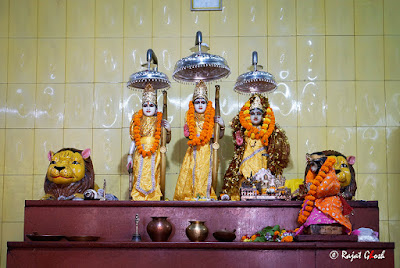Today is The Bengali New Year, the year is 1846
The New Year is calculated according to the solar Bengali calendar.
Poila (1) boisakh, is the first month, some of the stories around this are
" About the picture here :
Swastik is one of the most imp symbol represent auspiciousness, peace & prosperity. In Sanskrit it means may all be with you that you want. This symbol was created to symbolise the sun and the four arms of Swastik stands for 4 main direction - north south east and west
The metal pot of Kalash represent metirial things .the container of fertility the earth and the womb which nurtures and nourishes life. The mango leaves associated with Kama, the god of love, symbolize the pleasure aspect of fertility. The coconut, a cash crop, represents prosperity and power. The water in the pot represents the life-giving ability of Nature
Ganesha is widely revered as the remover of obstacles, the patron of arts and sciences and the deva of intellect and wisdom
The rest ; Gach sindur kouto kunke Kori mainly used for wedding ..
King Akbar for the purpose of tax collection started or modified this tradition. During the Mughal rule, land taxes were collected from Bengali people according to the Islamic Hijri calendar. This calendar was a lunar calendar, and its new year did not coincide with the solar agricultural cycles, creating problems during tax collection. Thus Akbar asked the royal astronomer Fathullah Shirazi to create a revised calendar using the solar Hindu calendar already in use, and this was known as Fasholi shan (harvest calendar). According to some historians, this started the Bengali calendar. According to Shamsuzzaman, it is called Bangla san or saal, which are Arabic and Persian words respectively, suggests that it was introduced by a Muslim king or sultan."
Story Two.
The New Year festival in eastern and northern states of India is linked to Hindu Vikrami calendar. This calendar is named after king Vikramaditya and starts in 57 BCE, in rural Bengali communities of India; the Bengali calendar is credited to "Bikromaditto", like many other parts of India and Nepal. However, unlike these regions where it starts in 57 BCE, the Bengali calendar starts from 593 CE suggesting that the starting reference year was adjusted at some point, which coincides with the reign of king Shashanka.
Story Three.
According to Sengupta, its traditional name is Bongabdo. The term Bongabdo (Bangla year) is found too in two Shiva temples many centuries older than Akbar era, suggesting that Bengali calendar existed well before Akbar's time. Despite arguments over who adopted the Bengali calendar and the New Year, states Sengupta, it helped collect land taxes after the spring harvest based on traditional Bengali calendar, because the Islamic Hijri calendar created administrative difficulties in setting the collection date.
( wikipidia and Poulami )
I spend the early part of the day visiting a temple or two,
to enjoy the peaceful ambiance of the temples and the aroma of incense and calm demeanor of people and flowers,
As Indians we like to break rules and it is everywhere, even in the temple” the sign says “ don’t light lamp here “
There is a rack, where one could light lamp, it is a secure fire place along with ease of Cleaning but then we like to do things our way, so what if it is more of a mess, and could lead to an accident, there are plenty of people (population) so it is ok, we are OK with losing a few people to a fire, so long as it is not someone who is directly related to us, else we will blame the government, or bring down the administration of the place, find some one to blame.
#ramnavami @makali #rajatghoshphotography #rajatghosh #photography #editorialphotography #editorialphotographyIndia






No comments:
Post a Comment